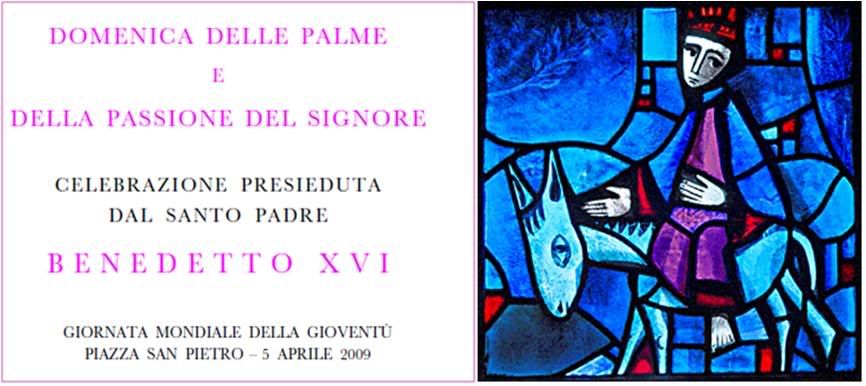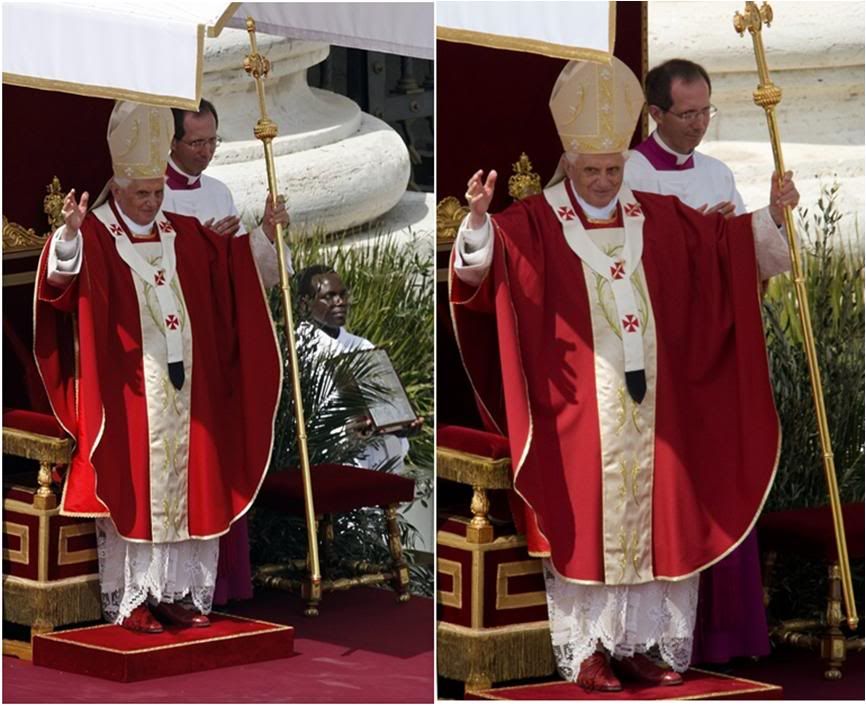| | | OFFLINE | | Post: 17.230 | Registrato il: 28/08/2005
| Utente Gold | |
|
HOMILY FOR PALM SUNDAY
and the XXIV WORLD YOUTH DAY, 4/6/09


Dear brothers and sisters,
dear young people!
Together with growing ranks of pilgrims, Jesus went up to Jerusalem for the Passover.
In the last stage of the journey, near Jericho, he healed the blind man Bartimaeus who had invoked him as Son of David, asking for help. And now, able to see, he joined the crowd of pilgrims in gratitude.
When, at the gates of Jerusalem, Jesus mounted a donkey - the animal symbolic of David's kingship - the pilgrims spontaneously broke out with the joyous certainty: "It is him, the Son of David!"
And so they hailed Jesus with the Messianic acclamation: "Blessed is he who comes in the name of the Lord!", adding, "Blessed is the kingdom of our father David that is to come! Hosanna in the highest!" (Mk 11,9f).
We don't know exactly what the enthusiastic pilgrims thought the coming Kingdom of David would be. And we, have we truly understood the message of Jesus, Son of David? Have we understood what the Kingdom is that he spoke of when he was questioned by Pilate? Do we understand what it means that this Kingdom is not of this world? Or do we perhaps wish that it should be of this world?
St. John, in his Gospel, after the account of the entry into Jerusalem, reports a series of statements by Jesus in which he explains the essentials of this new kind of Kingdom.
At a first reading of these texts, we can distinguish three different images of the Kingdom \in which the same mystery is reflected in different ways.
John recounts first of all that among the pilgrims who, during the feast, 'wished to adore God", there were also some Greeks (cfr 12,20). Let us take note that the true objective of these pilgrims was to adore God. This corresponds perfectly to what Jesus said on the occasion of the purification of the temple: "'My house shall be called a house of prayer for all peoples" OMk 11,17).
The true objective of pilgrimage should be to encounter God, to adore him, and thereby place the basic relationship in our life in its correct order.
The Greeks were in search of God - with their lives, they were on a journey toward God. Now, through two Greek-speaking apostles, Philip and Andrew, they sent on their message to the Lord, "We would like to see Jesus" (Jn 12,21). A great statement.
Dear friends, that is why we are gathered here: We want to see Jesus. For this reason, last year, thousands of young people went to Sydney. Certainly, they must have had multiple expectations for that pilgrimage. But the essential objective was this - "We want to see Jesus".
About the request, what did Jesus say and do at that time? It is not clear from the Gospel whether the Greeks did get to meet Jesus. Jesus's regard goes far beyond.
The nucleus of his response to the request was: "Unless a grain of wheat falls to the ground and dies, it remains just a grain of wheat; but if it dies, it produces much fruit" (Jn 12,24).
This means: it is not important now to have a conversation that's more or less brief with a few persons who will then return home. Like a grain of wheat that dies and rises again, I will return, in a totally different way and beyond the limits of this moment. I will meet the world and the Greeks.
Through the Resurrection, Jesus goes beyond the limits of space and time. As the Risen One, he is on the way towards the vastness of the world and of history. And yes, as the Risen One, he will go to the Greeks and speak with them, he will show them himself so that they, who were remote, become near, and his Word will come to them in a new way, in their own language, their culture, and will be understood in a new way - his Kingdom will come.
Thus we can recognize two essential characteristics of this Kingdom. The first is that this Kingdom comes by way of the Cross. Since Jesus gives himself totally, as the Risen One, he can belong to everyone and make himself present to everyone.
In the Holy Eucharist, we receive the fruit of the dead grain of wheat, the multiplication of loaves which will continue to the end of teh world and for all time.
The second characteristic is that the Kingdom is universal. Israel's ancient hope is fulfilled: this kingship of David no longer has boundaries. It extends 'from sea to sea' - as the prophet Zachariah says (9,10) - that is, it embraces the whole world.
However, this is only possible because it is not the kingship of a political power, but is based only on the free adherence to love - a love which responds to the love of Jesus who gave himself for everyone.
I think we must always learn both things anew - above all, the universality, the catholicity of the Kingdom of God. It means that no one can set himself as the absolute, not his culture, his time and his world. This requires that we must all accommodate each other, renouncing something of ourselves.
Universality includes the mystery of the Cross - overcoming oneself, obedience to the common world of Jesus Christ in our common Church. Universality is always overcoming the self, renouncing something personal. Universality and the cross go together. Only thus is peace created.
The statement about the grain or dead wheat is part of Jesus's answer to the Greeks - it is his response. But immediately afterwards, he formulates once more the fundamental law of human existence: "Whoever loves his life 16 loses it, and whoever hates his life in this world will preserve it for eternal life." (Jn 12,25).
Whoever wants to have his life for himself, live only for himself, holding everything to himself and availing of all possibilities - he loses his life. It becomes boring and empty. Only in abandoning the self, only in the disinterested giving of the "I" in favor of the 'you', only in the Yes to the greater life, that of God, then even our own life becomes ample and great.
Thus this fundamental principle which the Lord established, is in the last analysis, identical to the principle of love, Love, in fast, means leaving oneself, giving oneself, not wanting to possess oneself but to be free of it, not to fold in on oneself -'What is to become of me?" - but to look ahead, towards the other, toward God and towards the persons he sends me.
This principle of love, which defines man's journey, is once again identical to the mystery of the Cross, the mystery of death adn resurrection that we meet in Christ.
Dear friends, ti is perhaps relatively easy to accept this as a great fundamental vision of life. But in concrete reality, it is not enough to recognize a principle but to live its truth - the truth of the Cross and of the Resurrection.
Once again, this one great decision is not enough. It is certainly important to dare this great fundamental decision once, to dare the great Yes which the Lord asks us at a certain moment in our life.
But the great Yes of the decisive moment in our life - the Yes to the truth that the Lord sets before us - must then be reconquered daily in the situations of day to day, in which, ever anew, we must abandon our 'I', make ourselves available, even when at heart we really want to hold on to our 'I"\'.
But correct life also implies sacrifice, renunciation. Whoever promises a life without this ever renewed giving of oneself deceives others. There is no successful life without sacrifice. If I look back at my own personal life, I must say that the moments when i said Yes to a renunciation have been the great and important ones in my life.
Finally, St. John also caught, in his composition of the words of the Lord for Palm Sunday, a modified form of Jesus's prayer on the Mount of Olives, Above all, the statement: "I am troubled now" (12, 27). Here we see Jesus's fear, amply illustrated by the three other evangelists - his fear before the power of death, before the abyss of evil that he sees and into which he must descend. The Lord suffers our anguish with us, he accompanies us through the last agony into the light.
Then, John follows this with two questions from Jesus. The first, expressed only conditionally: "Yet what should I say? 'Father, save me from this hour'?" (12,27). As a human being, even Jesus feels impelled to ask that he be spared the terror of the Passion.
Even we can pray this way. Even we can lament before the Lord like Job, and present to him all the questions which emerge from us in the face of the injustice in the world and the difficulties of that same 'I'.
Before him, we should not hide behind pious phrases, in a fictitious world. To pray also means to battle with God, and like Job we can say to him: "I will not let you go until you bless me" (Gen 27,32).
Then comes Jesus's second question: "Glorify your name!" (Jn 12,28). In the synoptic Gospels, the question is placed this way: "Not my will but yours be done" (Lk 22, 42). In the end, the glory of God, his lordship, his will, is always more important and more true than my thought and my will.
And that's what is fundamental in our prayer and in our life: to learn this correct order of reality and accept it intimately; to confide in God and to believe that He is doing the right thing: that his will is truth and love; that my life becomes good if I learn to adhere to this order.
The life, death andesurrection of Jesus are for us the guarantee that we can truly trust in God. And it is this way that his Kingdom is realized.
Dear friends, at the end of this liturgy, the young people of Australia will turn over the Cross of World Youth Day to their contemporaries from Spain. The Cross is on a journey from end of the world to the other, from sea to sea.
And we shall be accompanying it. Let is proceed with it along its road and this way, we will find our own road. When we touch the Cross, or better, when we carry it, we touch the mystery of God, the mystery of Jesus Christ. The mystery that God so loved the world - us - enough to give his only begotten Son for us (cfr Jn 3,16).
We touch the marvelous mystery of God's love, the only truth that is truly redemptive. But we also touch the fundamental law, the constitutive norm of our life, the fact that without the Yes to the Cross, without walking in communion with Christ day after day, life cannot succeed.
The more we can make a great renunciation for love of the great truth and the great love - for love of the truth and love of God - the greater and richer our life becomes. Whoever wants to keep life for himself will lose it. Whoever gives his life - daily, in small gestures, that make up part of the great decision, - finds it.
This is the truth - demanding but also beautiful and liberating - in which we want to enter step by step during the journey of the Cross through the continents.
May the Lord bless this journey. Amen!
[Modificato da TERESA BENEDETTA 26/04/2009 19:26] |